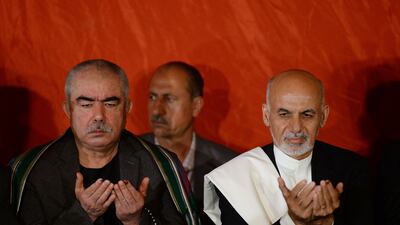Afghanistan’s warlords vowed to defend their strongholds from the Taliban and crush the insurgents. But, like the government’s forces, they too gave up with surprising ease.
As the insurgents swept through the north in a surprise offensive against Afghanistan’s anti-Taliban bastion, President Ashraf Ghani called for a national mobilisation of militia forces.
Despite his chequered history with the country’s warlords, the beleaguered president was hoping they could help turn the tide.
In the besieged northern city of Mazar-i-Sharif, Mr Ghani was looking to longtime strongman Atta Mohammad Noor and ethnic Uzbek warlord Abdul Rashid Dostum.
Both were known for their dogged defence against the Taliban in the 1990s, and had remained influential figures during the past two decades of war.
In the days leading up to their defeat, the greying commanders appeared to be the fearsome figures from their younger years.
“The Taliban never learn from the past,” Mr Dostum told reporters last week after flying back to Mazar-i-Sharif, while offering a not-so-subtle reference to the alleged massacre of the insurgents by his fighters in 2001.
“The Taliban have come to the north several times but they were always trapped. It is not easy for them to get out,” he said.
Mr Noor took to social media to issue his own warnings, posting graphic pictures of Taliban killed by his troops while promising to fight to the death.
“I prefer dying in dignity than dying in despair,“ Mr Noor wrote on Twitter, alongside other defiant posts vowing to “defend the nation”.
In a video posted on Facebook on Saturday, Mr Noor spoke calmly to camera dressed in military fatigues while rifle fire could be heard close by.
‘Cowardly plot’
Ultimately, bravado did not beat back the insurgents.
Late on Saturday, both men’s militias were routed after the Afghan military units they were supporting surrendered to the Taliban.
Mr Dostum and Mr Noor fled across the nearby Uzbek border.
Mr Noor claimed they had been the victims of deep-seated betrayal, saying on Twitter their resistance came to an end “as a result of a big organised & cowardly plot”. He offered no other details.
Video posted on pro-Taliban social media accounts, meanwhile, showed a group of young Taliban fighters combing through Mr Dostum’s gaudy residence, digging through cabinets and testing out overstuffed furniture.
Their rout came days after fellow strongman Ismail Khan was captured by Taliban fighters in the western city of Herat.
Mr Khan had, in the lead-up to his defeat, sounded like the same powerful figure who had ruled his fiefdom with such authority for decades that he earned the nickname “Lion of Herat”.
“We demand all the remaining security forces resist with courage,” he said last month.
But with a look of resignation, Mr Khan was on Friday forced to pose for pictures with Taliban fighters and give an interview to an insurgent media outlet.
After all the hefty promises and chest thumping, it was a humiliating end.































































